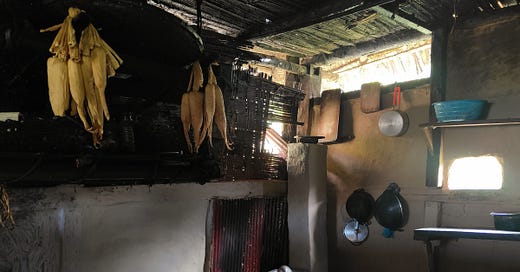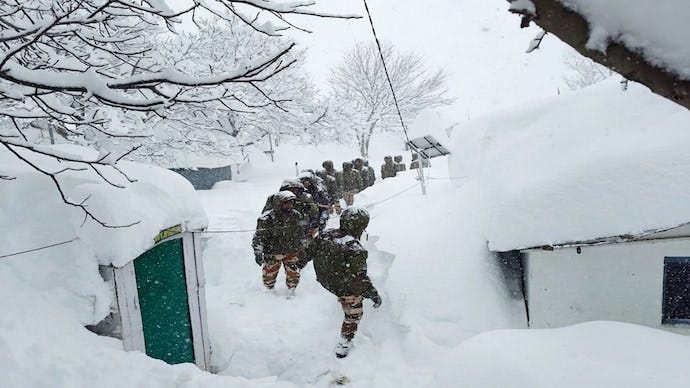Sunny climate stormy climate | Weekly digest #61
Flash floods wreak havoc in Kashmir and UK, the EU is diluting its sustainability laws, and an improved cooking stove is helping with conservation in a Himalayan community.
Hello folks!
Here’s this weeks dose of climate news where as usual I bring one sunny story that gives hope and two stormy ones that are a cause for alarm. Hope you like them!
🌩️ Stormy news 🌩️
1. Dry winter followed by late and heavy snowfall - A recipe for disaster in the Himalayas!
What are we talking about?
Till a week ago rainfall in Kashmir was seeing a 61% deficit. In fact, just a week ago Jammu & Kashmir’s Chief Minister was warning of an impending water crisis and the Khelo India winter games had to be cancelled due to insufficient snow in Gulmarg
But in the last week, the region has experienced flash floods due to heavy rainfall and snow. Several rivers (Suran in Poonch, Ujh in Kathua) are overflowing, while landslides have reportedly led to the shutdown of the Jammu-Srinagar highway.
It’s not just Kashmir. In Chamoli, Uttarakhand, there was an avalanche on Feb 28th after it received heavy rain and snow, in which 55 workers got buried.
Why does this matter?
This year, J&K has had an almost snowless Chillai Kalan, the 40-day harshest cold spell between December 21 and January 31. Then, the scenario changed suddenly when within 24 hours, on February 27, J&K received 311% excess precipitation.
A similar pattern was seen in Uttarakhand too. Winter in Uttarakhand, was almost fully dry this year. The rainfall was only 9% of the normal. Usually, Uttarakhand receives 75.7 millimetres (mm) rainfall from January 1 to February 15. But this year, only 6.9 mm rainfall was received in this period. But when the rains started on February 27, within 24 hours the state had received 37.1 mm rainfall.
The region has been seeing snowfall shifting to February and March, instead of December and January. The late rain and snow caused due to a warming climate can be dangerous.
Earlier the snowfall happened in Dec-Jan. At that time the ground remains quite cold, due to which the grip of fresh snow becomes stronger on the ground. In late Feb, the ground is warmer than in December-January and the density of fresh snow is less. This fresh snow is unable to hold on to the ground. In such a situation, when there is heavy snowfall, the weakly held snow on the ground below slips and an avalanche occurs.
This also has implications on glaciers. Usually, frost occurs after snowfall in December-January. This frost strengthens the fresh snow, which later becomes a part of the glacier. But now with snowfall in February and March, the snow melts as soon as it falls and is not converted into glaciers. This simply means that the area of glaciers is likely to continue decreasing in the coming years.
If these trends continue, we may see more frequent and intense flash floods, avalanches, and landslides, and retreating glaciers across the fragile Himalayas.
Sources for further reading
This newsletter, now also comes in the form of a Youtube show. Please check it out, subscribe and share it with a friend who prefers video to newsletters!
2. EU releases ‘Omnibus update’ on sustainability laws; Critics say this is ‘deregulation, not simplification’.
What are we talking about?
On 26 February, the European Commission released the Omnibus simplification package which talks about changes to their sustainability regulation. The key changes were:
Smaller companies get a free pass - Only companies that have over 1,000 workers (v/s 250 earlier) have to report their emissions now. That means 8 out of 10 firms are off the hook.
Less stringent rules on suppliers - In the new rules, companies will not be required to scrutinize indirect suppliers unless there are clear indications of harm and will not be required to ask for information from small suppliers.
Carbon Tax Loopholes - Importers bringing in less than 50 tons of goods yearly—like small steel traders—will be exempt from the CBAM ( Carbon Border Adjustment Mechanism) regulations. That’s 182,000 companies off the hook.
Companies will get more time to comply - For most companies, the deadline to start adhering to the new rules will be extended by 2 years.
Why does this matter?
While the EU commission has said that these changes will deliver simplification, several critics have said this is “deregulation, not simplification”
A statement by WWF says “The proposed changes would significantly weaken the law, minimise its impact and limit the obligations for companies to address human rights and environmental risks in their supply chains. These proposals undermine global efforts to promote corporate accountability. This shift benefits large corporations while ignoring violations of human rights and environmental destruction.”
Sources for further reading
🌞 Sunny news 🌞
3. The cooking stove helping with conservation in Lepcha homes
What are we talking about?
The Lepcha community in the Eastern Himalayas has traditionally lived in balance with nature, but increasing reliance on firewood which was their primary cooking fuel posed challenges for conservation.
Now, they have started using improved cooking stoves as part of an initiative, introduced by WWF India.
ICS exposes as much of the cooking pot to the hot gasses as possible to maximise heat transfer and uses the insulating properties of mud to prevent energy loss through conduction.
It reduces their dependence on firewood, emits less smoke and directs the spoke outside, improving the indoor air quality in the kitchen, which is an added advantage. However, the main advantage of this model of ICS is that they are made using clay, wood husk, cow dung and other locally available materials.
Why does this matter?
In traditional rural households, where cooking is central to daily life, the Improved Cooking Stove reduces the frequency and amount of firewood collection, ultimately preserving forest resources.
By lessening the need to gather firewood, ICS lowers human interference in forest ecosystems, reducing habitat degradation and promoting biodiversity - including protecting the endangered red panda.
It is a cleaner, more efficient cooking method that reduces indoor air pollution
Improved Cooking Stove is a perfect example of a technology that aligns with the community’s lifestyle while also advancing conservation.
Sources for further reading
You can read previous editions of the newsletter -
Sunny climate, stormy climate | News Digest #60
Sunny climate, stormy climate | News Digest #59
Sunny climate, stormy climate | News Digest #58
If you liked this newsletter, please hit like or leave a comment. If you are a climate champion and want to take this conversation to more people, please share the newsletter with a friend, family member or colleague who may like it too!






Great read and congrats on that YT channel :)